SEO
How to Gain SEO Experience & Improve Your Skills
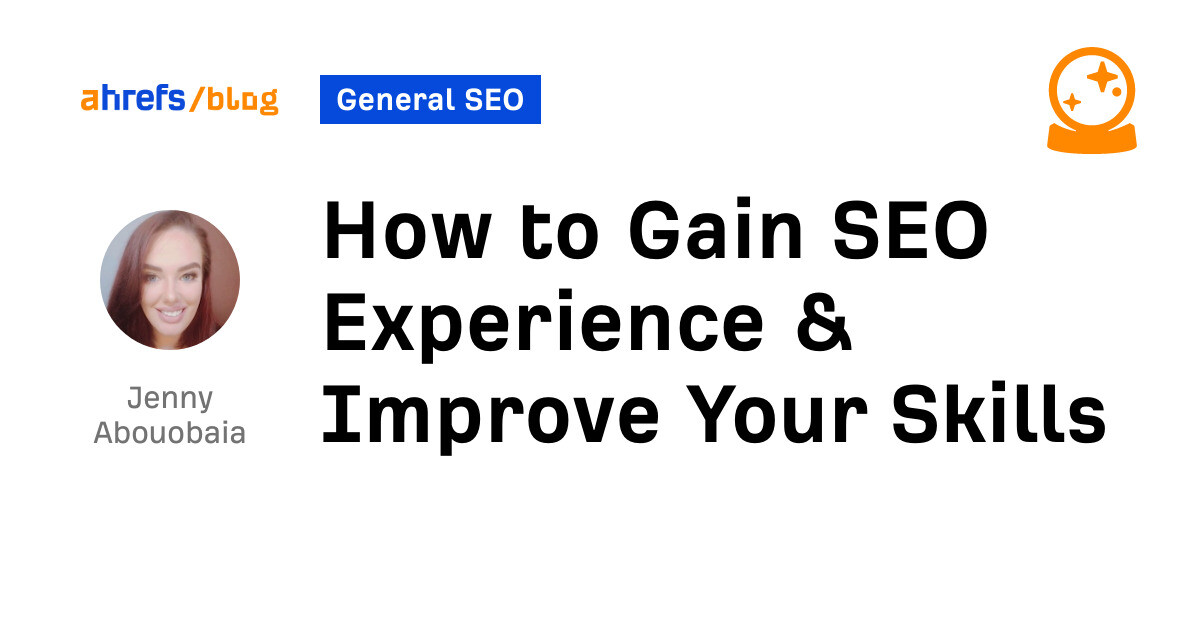
Of course, the idea of learning any new craft is daunting. For many looking in from the outside, SEO can seem like some Hogwarts-level digital wizardry. However, in an ever-changing world of Google updates and advancing AI, even OG SEOs will tell you they are always learning.
But with an abundance of blogs, Youtube channels, and courses out there dedicated to sharing SEO knowledge, it can be challenging to know what SEO experience you really need to get started with a career in search.
In this article, we’ll look at which essential SEO skills and knowledge you need to develop and how to build an SEO portfolio and gain SEO experience.
It’s important to start with a couple of cautionary statements.
First, know that even the best guidance and advice aren’t right for everyone. Every website is different. Therefore, each has its own needs and things that work. The type of website and industry also play a massive role in what a site needs.
Secondly, the skills and knowledge you need to develop will depend on your specialty. For example, a content specialist will ultimately need an in-depth knowledge of on-page optimization above all else.
But having a rounded understanding of all elements of SEO is always important, regardless of whether you intend to be a generalist or a specialist.
Learn your SEO fundamentals
Understanding the fundamental elements of SEO is one of the most important aspects when looking to gain SEO experience. Let’s look at the fundamentals, why they are important, and what they include.
Keyword research
Keyword research is the foundation of SEO. If you want to gain SEO experience, this is the first aspect you need to understand.
Keyword research is finding which search queries your target audience is typing into search engines like Google when looking for products, services, or information.
Remember that the main goal of any search engine is to offer the most relevant and helpful answer to a search query. Keywords allow you to optimize your pages efficiently so that search engines understand your content and how it meets the search intent.
It doesn’t matter whether you’re working on the website for a local business, an affiliate site, or a hobby blog. If you produce content on a topic that no one is searching for, you won’t get any traffic from search engines to those pages.
This is one of the biggest mistakes new businesses make. Many do not understand the need or importance of keyword research, and this is part of the reason why studies show that 90.63% of pages on the internet get no traffic from Google.
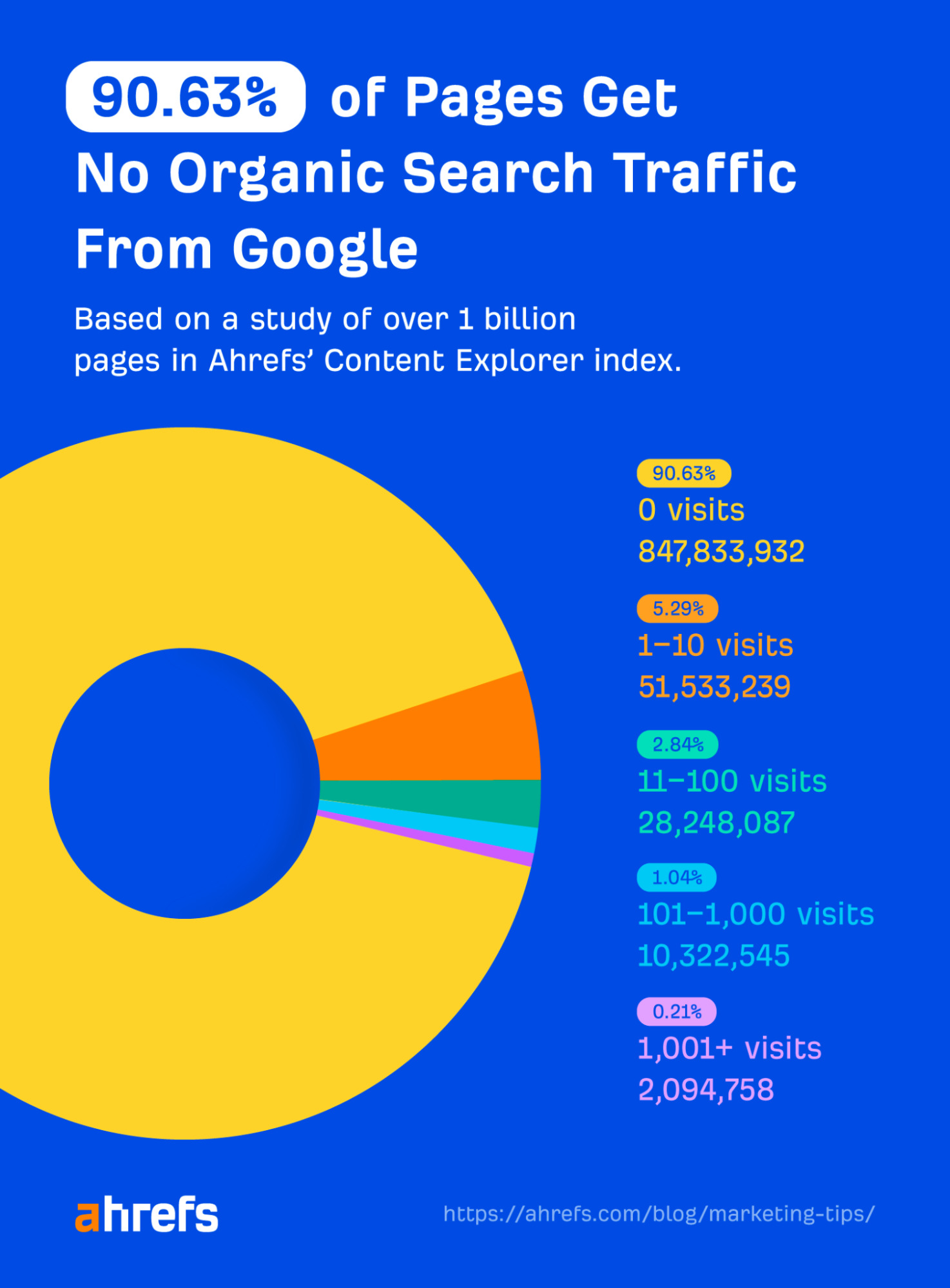
Some different aspects of keyword research include:
Ahrefs’ Keywords Explorer is a great place to start gaining experience performing keyword research. It can help you with finding long-tail keywords, keyword mapping, clustering, and more.
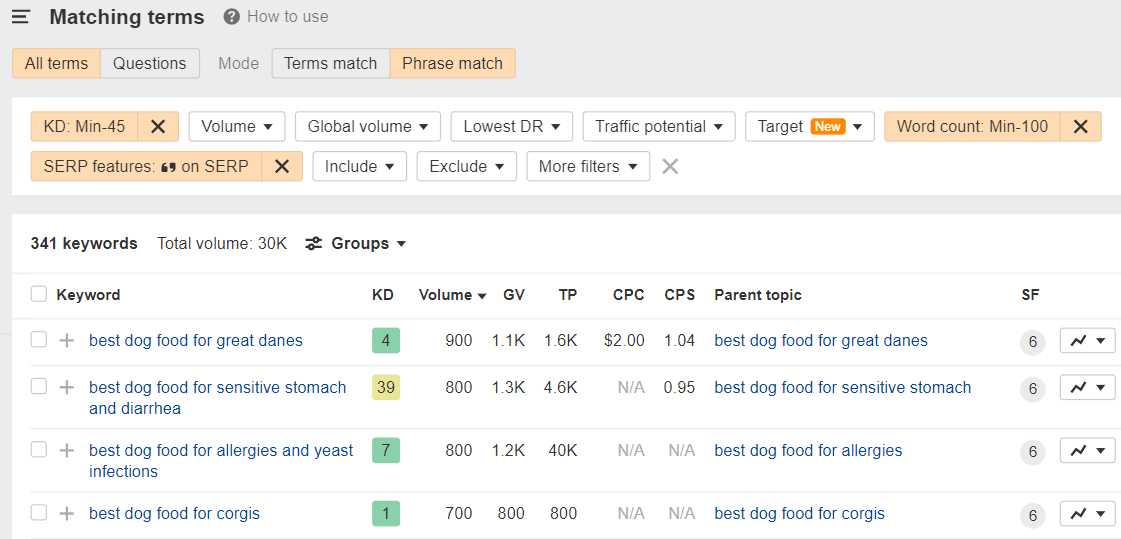
On-page optimization
I can’t stress enough how important gaining experience in on-page SEO is. For things like technical or off-page SEO, it’s common to have a specialist handle them. But if you want to work in the SEO field, you must have a clear understanding of what on-page is and how it works.
On-page SEO is optimizing your website’s pages to achieve higher rankings in the search engine results pages (SERPs).
On-page optimization allows you to work on aspects of a website you can control. Sometimes, even small, basic changes can make a huge difference in a website’s rankings.
When done well, on-page optimization can assist Google in understanding your content, how pages relate to one another, and how your pages connect to individual search queries.
Common on-page optimizations include:
Off-page optimization
Unlike on-page, off-page optimization focuses on aspects that you cannot control on your own site but can still influence your rankings on the SERPs. This mainly consists of link building and brand marketing.
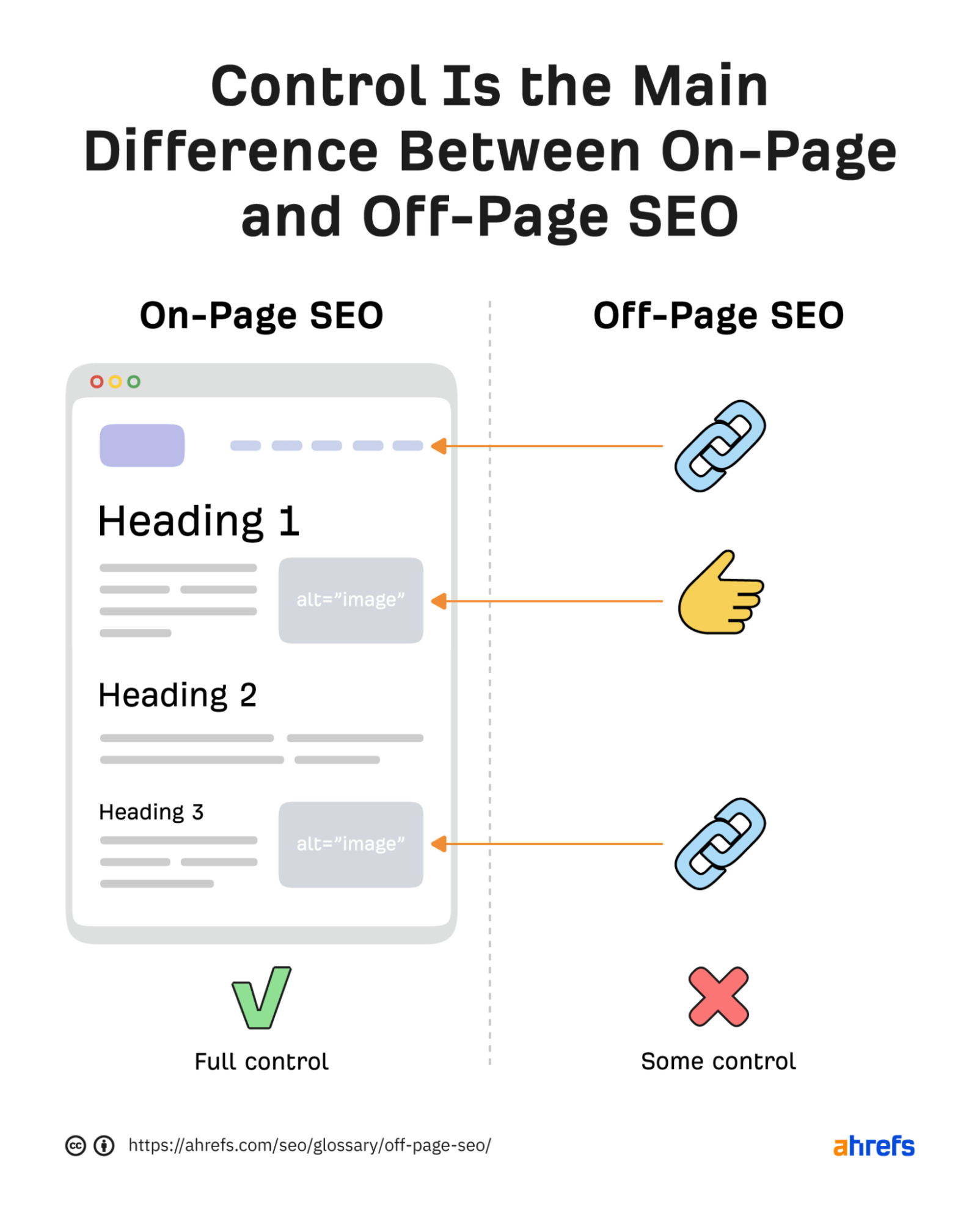
When determining which queries you should rank for and where on the SERPs, Google considers external factors, such as backlinks.
Popular off-page techniques include:
These techniques can help influence your rankings on the SERPs by promoting topical relevance and perceived authority with search engines.
If you’re interested in learning more about off-page SEO and, in particular, link building, check out our free advanced link building course.
Technical SEO
Technical SEO is the process of making technical improvements to your website to ensure search engines can find, crawl, and index it.
Technical SEO is incredibly important. Ensuring your website is technically sound is a core foundation of SEO.
When it comes to gaining SEO experience, you wouldn’t expect to perform advanced technical tasks as a newbie. But ensuring your website can be indexed, for example, means your website can even appear on the SERPs in the first place.
So even though you may not want to be a technical specialist, it’s important to at least understand what the different aspects of technical SEO are and how they affect your website.
Some common technical SEO elements include:
Learn how to use essential SEO tools
There are several essential tools that every SEO needs to get to grips with, including Google Analytics and Google Search Console. Understanding how these tools work and how to use them means you can properly evaluate your website’s SEO performance.
However, some additional tools can be added to your stack to assist you with your day-to-day SEO duties, helping you work smarter, not harder.
Many tools can significantly cut down the time needed to do specific tasks, leaving you more time to focus on the areas that need your skills and expertise. Tools can also help to set up automated tasks.
Using a tool like Ahrefs’ Site Audit means you can set up automated weekly or monthly website audits. This can be incredibly helpful in alerting you if something has gone wrong somewhere on your site and then prompt you to take an in-depth look at the issue when alerted.
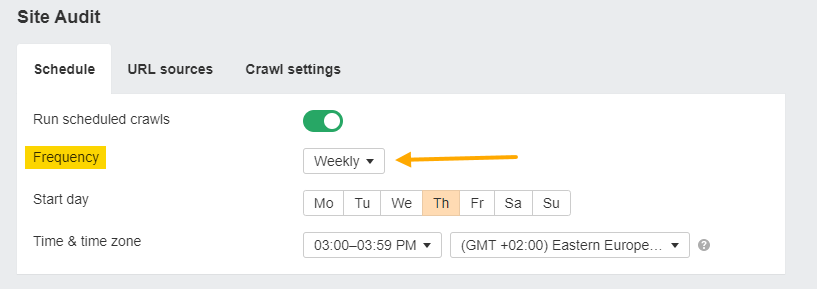
Here are some examples of tools you may want to include in your stack:
- Website auditing tool
- Keyword research tool
- Content optimization tools
- Rank tracking tool
Trying to land yourself an SEO job can be a chicken-and-egg situation. For example, when looking to work as a freelancer, no one is willing to give you work without proven experience. But how do you get experience without doing the work?
Well, there are some ways you can enhance your skills and work on sites that can become part of your portfolio without landing freelance clients.
Personal projects
The easiest way to get started is to build your own digital assets. With as little as a domain and hosting, you can get started building a site and optimize it for search engines.
This can be a way to try every aspect of SEO. You can even make mistakes and learn without sending someone’s online business crashing. It also lets you see which areas you prefer to work in and which aspects you may have a natural talent for.
Even after years of working in the industry, I still use several sites solely for testing purposes. This allows me to try new things, see what works and doesn’t, and hone my craft.
Skill exchanges
Skill exchanges are not something new. Often, it’s a win-win situation for both parties because both get what they want simply by offering their time or services as repayment.
In fact, a good example is Skill Harbour, a skill exchange platform. It allows you to post your needs with the offer of exchanging them for your skills.
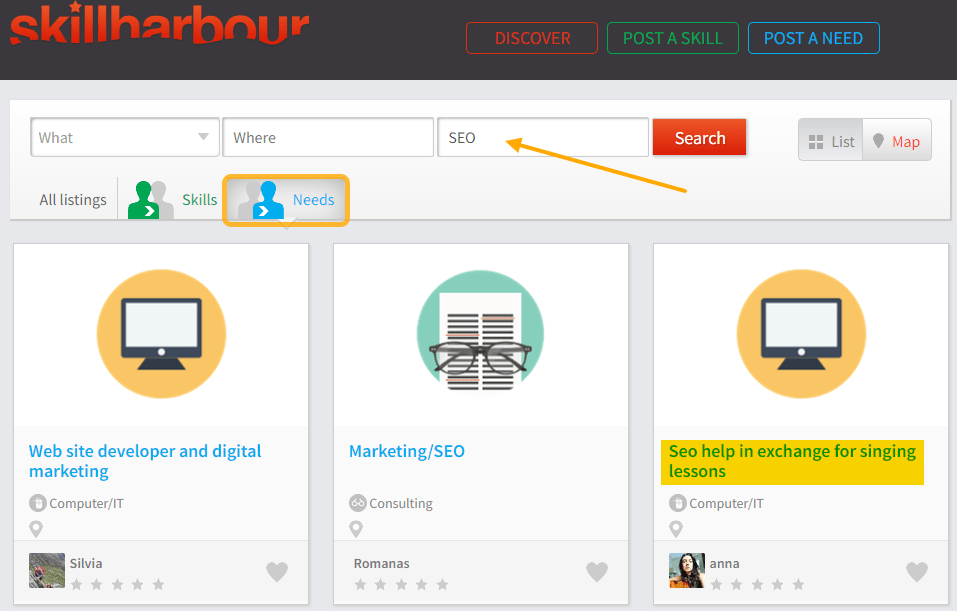
Is there a personal trainer at your gym who needs a website and can give you some PT sessions in exchange? Or maybe a local dance studio’s website needs on-page optimization and, in return, the studio is willing to give your kids some ballet lessons?
Skill exchanges are a great way to build experience and add to your portfolio. Plus, as the other party is not investing their hard-earned cash, they are more likely to give you a chance even if you have little to no proven experience.
Charity work
Similar to skill exchanges, offering your skills and services as a volunteer to different organizations allows you to build your experience and portfolio.
Websites like Devon Voluntary Action allow you to search for volunteer opportunities based on your skills.
You can also contact charity organizations that could use some SEO assistance. You can simply perform a Google search for charities in your area (or further). With Ahrefs’ SEO Toolbar, it’s easy to see the metrics for each site directly on the SERPs.
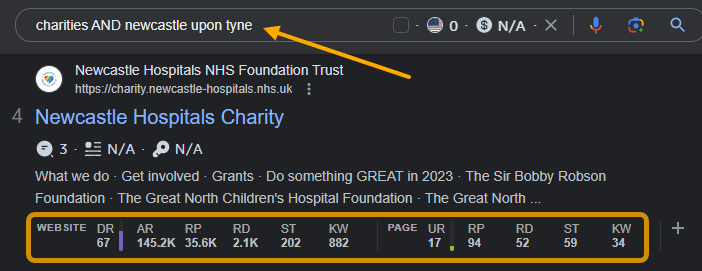
This can help you identify which websites could use some additional SEO help to narrow down a list to reach out to.
Internships
There is no better way to gain experience in SEO than actually doing the work. Internships allow you to work on real-world projects while gaining training from a team of experts in some of the biggest, industry-leading companies.
Internships are rarely paid positions. Much like a skill exchange or charity work, they let you build your skills, experience, and knowledge in return for your time.
On-the-job experience
Although working freelance or in-house is probably not an option for SEO newbies, there are some SEO agencies that take junior-level SEOs and offer on-the-job training. Unlike internships, these are paid positions, but you can expect to be at the bottom of the ladder.
This gives you first-hand experience working on multiple websites and the opportunity to learn from seasoned professionals. Many agencies also have career progression opportunities, allowing you to work your way up the ranks as your skills progress.
One thing about SEO is that it is constantly evolving. This is one of the best parts of SEO for someone like me who loves to learn. However, it does mean that if you want to be (or remain) an expert, you must continuously stay up to date with what is happening.
There are always new algorithm updates to navigate, tools to try out, and what works today won’t necessarily work next year.
Following industry leaders and blogs, as well as the illusive “SEO Twitter,” all help you to keep your finger on the pulse with the hottest conversations. Also, following SEO podcasts and newsletters helps you to gain insights from top experts every week.
Final thoughts
Gaining experience is the first crucial step to pursuing a career in SEO. Getting to grips with the fundamentals and gaining real-world experience are key aspects of improving your skills and knowledge.
If you’re looking to get started with SEO, a great place to start is with our free SEO training course.
Got questions? Ping me on Twitter.
SEO
Google Declares It The “Gemini Era” As Revenue Grows 15%

Alphabet Inc., Google’s parent company, announced its first quarter 2024 financial results today.
While Google reported double-digit growth in key revenue areas, the focus was on its AI developments, dubbed the “Gemini era” by CEO Sundar Pichai.
The Numbers: 15% Revenue Growth, Operating Margins Expand
Alphabet reported Q1 revenues of $80.5 billion, a 15% increase year-over-year, exceeding Wall Street’s projections.
Net income was $23.7 billion, with diluted earnings per share of $1.89. Operating margins expanded to 32%, up from 25% in the prior year.
Ruth Porat, Alphabet’s President and CFO, stated:
“Our strong financial results reflect revenue strength across the company and ongoing efforts to durably reengineer our cost base.”
Google’s core advertising units, such as Search and YouTube, drove growth. Google advertising revenues hit $61.7 billion for the quarter.
The Cloud division also maintained momentum, with revenues of $9.6 billion, up 28% year-over-year.
Pichai highlighted that YouTube and Cloud are expected to exit 2024 at a combined $100 billion annual revenue run rate.
Generative AI Integration in Search
Google experimented with AI-powered features in Search Labs before recently introducing AI overviews into the main search results page.
Regarding the gradual rollout, Pichai states:
“We are being measured in how we do this, focusing on areas where gen AI can improve the Search experience, while also prioritizing traffic to websites and merchants.”
Pichai reports that Google’s generative AI features have answered over a billion queries already:
“We’ve already served billions of queries with our generative AI features. It’s enabling people to access new information, to ask questions in new ways, and to ask more complex questions.”
Google reports increased Search usage and user satisfaction among those interacting with the new AI overview results.
The company also highlighted its “Circle to Search” feature on Android, which allows users to circle objects on their screen or in videos to get instant AI-powered answers via Google Lens.
Reorganizing For The “Gemini Era”
As part of the AI roadmap, Alphabet is consolidating all teams building AI models under the Google DeepMind umbrella.
Pichai revealed that, through hardware and software improvements, the company has reduced machine costs associated with its generative AI search results by 80% over the past year.
He states:
“Our data centers are some of the most high-performing, secure, reliable and efficient in the world. We’ve developed new AI models and algorithms that are more than one hundred times more efficient than they were 18 months ago.
How Will Google Make Money With AI?
Alphabet sees opportunities to monetize AI through its advertising products, Cloud offerings, and subscription services.
Google is integrating Gemini into ad products like Performance Max. The company’s Cloud division is bringing “the best of Google AI” to enterprise customers worldwide.
Google One, the company’s subscription service, surpassed 100 million paid subscribers in Q1 and introduced a new premium plan featuring advanced generative AI capabilities powered by Gemini models.
Future Outlook
Pichai outlined six key advantages positioning Alphabet to lead the “next wave of AI innovation”:
- Research leadership in AI breakthroughs like the multimodal Gemini model
- Robust AI infrastructure and custom TPU chips
- Integrating generative AI into Search to enhance the user experience
- A global product footprint reaching billions
- Streamlined teams and improved execution velocity
- Multiple revenue streams to monetize AI through advertising and cloud
With upcoming events like Google I/O and Google Marketing Live, the company is expected to share further updates on its AI initiatives and product roadmap.
Featured Image: Sergei Elagin/Shutterstock
SEO
brightonSEO Live Blog

Hello everyone. It’s April again, so I’m back in Brighton for another two days of Being the introvert I am, my idea of fun isn’t hanging around our booth all day explaining we’ve run out of t-shirts (seriously, you need to be fast if you want swag!). So I decided to do something useful and live-blog the event instead.
Follow below for talk takeaways and (very) mildly humorous commentary. sun, sea, and SEO!
SEO
Google Further Postpones Third-Party Cookie Deprecation In Chrome

Google has again delayed its plan to phase out third-party cookies in the Chrome web browser. The latest postponement comes after ongoing challenges in reconciling feedback from industry stakeholders and regulators.
The announcement was made in Google and the UK’s Competition and Markets Authority (CMA) joint quarterly report on the Privacy Sandbox initiative, scheduled for release on April 26.
Chrome’s Third-Party Cookie Phaseout Pushed To 2025
Google states it “will not complete third-party cookie deprecation during the second half of Q4” this year as planned.
Instead, the tech giant aims to begin deprecating third-party cookies in Chrome “starting early next year,” assuming an agreement can be reached with the CMA and the UK’s Information Commissioner’s Office (ICO).
The statement reads:
“We recognize that there are ongoing challenges related to reconciling divergent feedback from the industry, regulators and developers, and will continue to engage closely with the entire ecosystem. It’s also critical that the CMA has sufficient time to review all evidence, including results from industry tests, which the CMA has asked market participants to provide by the end of June.”
Continued Engagement With Regulators
Google reiterated its commitment to “engaging closely with the CMA and ICO” throughout the process and hopes to conclude discussions this year.
This marks the third delay to Google’s plan to deprecate third-party cookies, initially aiming for a Q3 2023 phaseout before pushing it back to late 2024.
The postponements reflect the challenges in transitioning away from cross-site user tracking while balancing privacy and advertiser interests.
Transition Period & Impact
In January, Chrome began restricting third-party cookie access for 1% of users globally. This percentage was expected to gradually increase until 100% of users were covered by Q3 2024.
However, the latest delay gives websites and services more time to migrate away from third-party cookie dependencies through Google’s limited “deprecation trials” program.
The trials offer temporary cookie access extensions until December 27, 2024, for non-advertising use cases that can demonstrate direct user impact and functional breakage.
While easing the transition, the trials have strict eligibility rules. Advertising-related services are ineligible, and origins matching known ad-related domains are rejected.
Google states the program aims to address functional issues rather than relieve general data collection inconveniences.
Publisher & Advertiser Implications
The repeated delays highlight the potential disruption for digital publishers and advertisers relying on third-party cookie tracking.
Industry groups have raised concerns that restricting cross-site tracking could push websites toward more opaque privacy-invasive practices.
However, privacy advocates view the phaseout as crucial in preventing covert user profiling across the web.
With the latest postponement, all parties have more time to prepare for the eventual loss of third-party cookies and adopt Google’s proposed Privacy Sandbox APIs as replacements.
Featured Image: Novikov Aleksey/Shutterstock
-

 PPC7 days ago
PPC7 days ago19 Best SEO Tools in 2024 (For Every Use Case)
-
SEARCHENGINES6 days ago
Daily Search Forum Recap: April 19, 2024
-
SEARCHENGINES7 days ago
Daily Search Forum Recap: April 18, 2024
-

 WORDPRESS6 days ago
WORDPRESS6 days agoHow to Make $5000 of Passive Income Every Month in WordPress
-

 WORDPRESS5 days ago
WORDPRESS5 days ago13 Best HubSpot Alternatives for 2024 (Free + Paid)
-

 SEO7 days ago
SEO7 days ago25 WordPress Alternatives Best For SEO
-

 WORDPRESS6 days ago
WORDPRESS6 days ago7 Best WooCommerce Points and Rewards Plugins (Free & Paid)
-

 MARKETING6 days ago
MARKETING6 days agoBattling for Attention in the 2024 Election Year Media Frenzy















